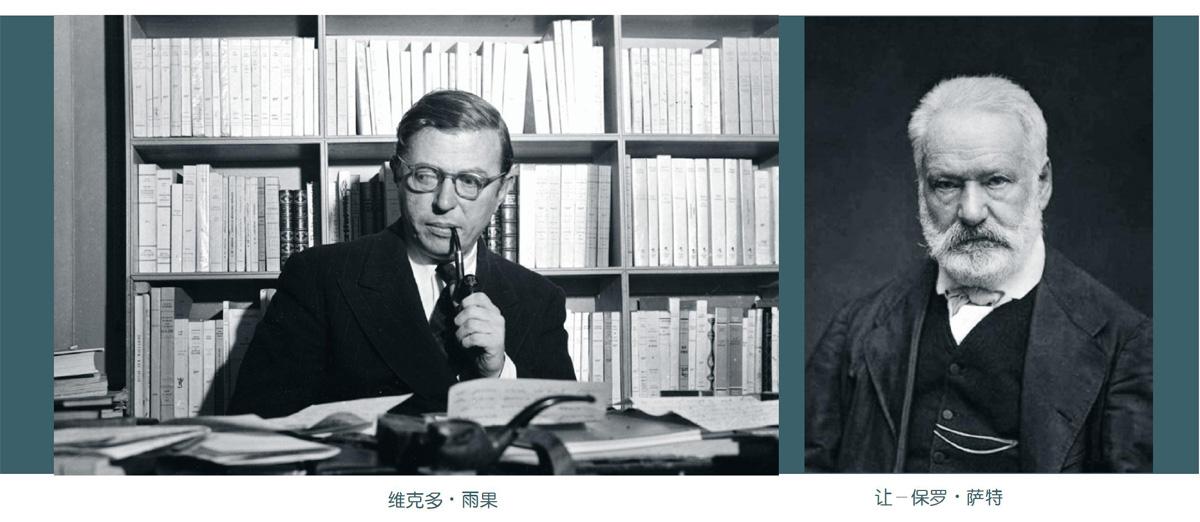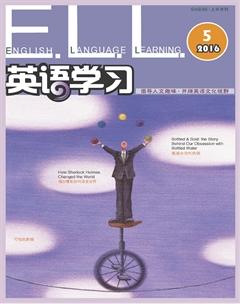法语:巴黎最美的桥梁
祝平

The Most Beautiful Bridge in Paris
法国人对自己的语言以及文化天生有一种自豪感,他们认为法语是世界上最美丽的语言。本文作者Leo通过本学期在巴黎作交换生的机会,深入学习法语并深深被法语的语言魅力所吸引。语言不光是交流的工具,更是通向一个国家文明和文化的桥梁。
1. oral: 口头的。
2. Sciences Po Paris: 巴黎政治学院;straddle: 跨越;contemporary: 当代的。
3. mingle with: 交谈,交往;interplay: 相互影响,相互作用;assimilation: 同化,吸引,后文assimilate为其动词形式;adaptation: 适应。
4. Academie Fran?aise: 法兰西学院; frequent: 经常出入于;Hemingway: 欧内斯特·海明威(Ernest Hemingway, 1899—1961),美国著名作家、记者,20世纪最著名的小说家之一;Sartre: 让-保罗·萨特(Jean-Paul Sartre, 1905—1980),法国哲学家、文学家;clarity: 清晰,清楚。
5. rectify: 改正。
6. sear: 烙印,铭记。
7. interrupt: 打断;accent: 强调,重读;lurch: 突然倾斜。
8. 当我结巴着说完整句话时,这个巴黎人就斜靠在他的椅子上——这是一幅滑稽的画面,就像是一位满意的君主刚刚将他的一部分财宝赏赐给他那些一贫如洗的臣子。stammer: 结巴着说出;recline on: 斜靠;splitting: 滑稽的;monarch: 君王,帝王;bestow: 授予;a portion of: 一份,一部分;impoverished: 贫困的;vassal: 封臣。
9. 这些打断看上去很直接,但它表明了法国人想要将外国人同化进法国文化影响范围内的那种老旧想法。blunt: 直率的;manifest: 显示,表明;mentality: 心态,心理;sphere of influence: 势力范围,影响范围。
10. mission: 使命;civilize: 教导,使文雅。
11. justified: 合乎情理的。
12. boast: 以有……为自豪;encompass: 包含;vibrant: 有活力的;intellectual: 知识分子;heritage: 传统,遗产。
13. hole-in-the-wall: 简陋的,狭小的;bespectacled: 戴眼镜的;signal: 以动作示意。
14. recite: 背诵;Victor Hugo: 维克多·雨果(1802—1885),法国文学史上最伟大的作家之一。
15. verse: 诗节;warring: 交战的,敌对的;in vain: 没有成功,徒劳;illuminate: 解释。
16. lay the foundation of: 奠定……的基础。
17. privilege: 殊荣,荣幸;legacy: 遗产;sophistication: 有教养,温文尔雅。
18. conduct: 进行;lightning: 闪电般的,快速的; arrogance: 自大,傲慢;goodwill: 友好,善意。
19. infuriating: 令人大怒的;integrate: 使成为一体。
20. merci: 法文中的“谢谢”;cultural gap: 文化差异;personify: 清楚体现;motto: 格言;batter: 猛击,这句格言意为“任凭海浪击打,也永不沉没。”
21. hub: 中心;multilingualism: 多语制。
22. turn up ones nose at: 对……不屑一顾;refine: 改善;fluency: 流利。
23. Franglish: 英语和法语交互课程; encounter: 遇到;range from: 从……到……;nuclear engineer: 核能工程师;civil servant: 公务员。
24. a gleam in sb.s eye: 想法,愿望。
25. slip: 滑动,这里指来回转换。
26. light up: 面露喜色。
27. perpetual: 不断的;self-renewal: 自我更新。
28. cosmopolitanism: 世界大同主义。
29. adorn: 装饰;lampshade: 灯罩;trinket: 小玩意儿;Vietnam: 越南;Algeria: 阿尔及利亚;be obsessed with: 痴迷于;astound: 使惊愕;embrace: 接受;multiculturalism: 多元文化论。
30. peer: 这里指同学,同龄人。
31. furrowed brow: 紧皱的眉头;splutter: 结结巴巴;waver: 动摇。
32. 试图接纳法国国内不同种族的人群,这或许说明了新一代法国人的文化价值观发生了改变。accommodate: 容纳; diversity: 多样性;shift: 改变。
33. xenophobia: 仇外,排外;grip: 强烈地影响。
34. solely: 单独地,唯一地;ethnicity: 种族划分。
35. superiority: 优越性。
36. insistence: 坚持;encapsulate: 压缩,概括。
37. by extension: 引申开来;unprecedented: 空前的,前所未有的。
38. glorious: 輝煌的,荣耀的;interconnected: 相互连接的。
39. Seine River: 塞纳河,位于法国巴黎; snatch: 夺去。
A language does not just build bridges for oral1 communication, but also for cultural communication. Three weeks into my study abroad program at Sciences Po Paris, Ive straddled the border between traditional and contemporary French culture,2 as seen through the perspective of languages. Through mingling with locals and my fellow students, Ive opened my eyes to the interplay between the cultural assimilation and adaptation that takes place in Paris every day when we speak.3
The French are proud of their language, and not ashamed to make sure everyone gives it the proper respect. From the Academie Fran?aise to the cafés once frequented by Hemingway and Sartre, speaking French is not about clarity.4 Its about speaking correctly. The French will not hesitate to rectify5 a mistake. A conversation with an old Parisian seared6 this aspect of their culture in my memory. Two words. Thats all I was able to say before he interrupted with his correction, accented with widened eyes and a small lurch forward with his head.7 As I stammered through the rest of my sentence, the Parisian reclined on his chair: the splitting image of a pleased monarch who had just bestowed a portion of his treasure to his impoverished vassals.8 Blunt as it may seem, these interruptions manifest the old mentality of assimilating foreigners into the French cultural sphere of influence.9 In other words, a “mission to civilize.”10
Perhaps their behavior is justified11. The French not only boast of a literary tradition that encompasses some of the most vibrant intellectuals in human history, but also cannot wait to share that heritage with others.12 In the middle of lunch at a hole-in-the-wall café, the bespectacled owner shut the doors and signaled for silence.13 As all eyes turned to him, he began reciting a poem by Victor Hugo.14 With verses like: “For 6,000 years, war/ delights us warring peoples,/ and Gods work is in vain/ when he made the stars and the flowers”, the poem illuminates why the French consider their language as a gift,15 even a blessing, to be shared with the world. By knowing French, you open the door to experiencing firsthand the traditional ideas that have laid the foundation of16 modern political and literary thought. They consider it a privilege to assimilate into this rich legacy of sophistication.17 As I struggle through my classes that are all conducted in French, as well as interact with my fellow French classmates who speak at lightning speed, Ive realized that this arrogance is one way the French express goodwill.18 Each correction, however infuriating it may be, is simply meant to integrate me deeper into the gift of Frances cultural heritage.19 Tough love, as we say. But each time I smile and say “merci” after I am corrected once again, I know that Im slowly bridging the cultural gap by personifying the motto of Paris: “Battered by waves, but never sunk.”20
On the other hand, Paris has quickly adapted to its role as a global hub, especially in regards to multilingualism.21 For every Parisian who turns up his nose at learning English, another will seek out every opportunity to refine her fluency.22 Invited by my friends to a “Franglish” session, where native-English speakers are paired with French speakers, I encountered a colorful crowd ranging from nuclear engineers to civil servants in the French Foreign Service.23 Yet everyone shared the same hungry gleam in their eyes.24 A hunger to flow with the modern age. Over a couple of beers that relaxed the atmosphere, we slipped25 from French to English every seven minutes, and then back again. As I pointed out the minor mistakes as they spoke, I saw a reflection of myself. My language partners also lit up26 with a smile and made the change immediately, sometimes writing the correction down. Their drive to improve their English personifies the spirit of modern Paris, that of perpetual self-improvement and self-renewal.27
This drive extends to other languages as well, no matter the difficulty. Even though Paris is known for its cosmopolitanism28, there is nothing quite like it until you witness it with your own eyes. From a host family who has adorned their apartment with lampshades and trinkets from Vietnam to a French classmate from Algeria who speaks five languages and is obsessed with Korean dramas, I am always astounded by this embrace of multiculturalism.29 Among my French peers30, learning Chinese, Korean or Arabic is becoming increasingly popular. Despite the furrowed brows and splutters when they practice Chinese with me, their determination never wavers.31 By working to accommodate the diversity of peoples within its borders, perhaps this represents a shift in cultural values among the new generation of French.32 Perhaps they acknowledge that France needs the cooperation of all its peoples, no matter their origin, in order to bridge their classical country with the rapidly globalizing world. Despite the current wave of xenophobia gripping France,33 I am confident that the spirit of being battered, but never sunk will guide the French through this difficult time. After all, hating one another based solely on ethnicity is practically impossible once youve built bridges between cultures,34 especially through language.
The French people, especially Parisians, have established a mentality of cultural superiority35. Their insistence on speaking French, and speaking it correctly, encapsulates their traditional pride in the French intellectual heritage.36 But as Paris, and by extension France, faces an unprecedented challenge of integrating peoples from all over the world,37 perhaps this new spirit of looking outwards to new languages will guide France through these troubled times. After all, speaking a language builds bridges not only with the glorious legacies of the past, but also towards integrating those legacies with the interconnected world of the future.38 And among all the bridges along the Seine River that snatch your breath away,39 the language of cultural communication shines as the most beautiful bridge of them all.

